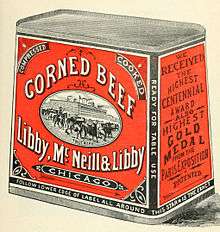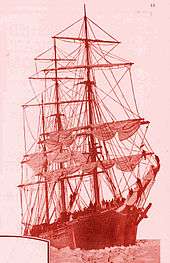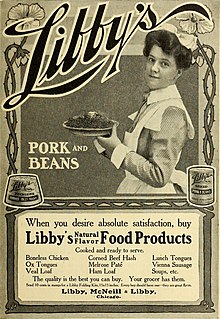Libby's
Libby's is a brand of canned food and beverages owned by Libby's Brand Holding based in Geneva, Switzerland, and licensed to several companies around the world.
 | |
| Industry | Food processing |
|---|---|
| Founded | 1869 |
| Headquarters | Chicago, Illinois |
| Products | Canned food and beverages |
| Website | http://libbys.com |


History
The company was founded as Libby, McNeill & Libby in Chicago, Illinois, by Archibald McNeill and the brothers Arthur and Charles Libby. The business began with a canned meat product, beef in brine, or corned beef. The product became well-known when the company began to package the meat in a trapezoid-shaped can starting in 1875.[1] By 1880, it had 1,500 employees in Chicago.[2]
Libby, McNeill & Libby was acquired by Nestlé in 1970.[3]
Nestlé introduced Juicy Juice in 1977 and it was branded under the Libby's name. In 2006, Nestlé began to market Juicy Juice. In 2014, the Juicy Juice brand and business was sold by Nestlé to Harvest Hill Beverage Company, a portfolio company of Brynwood Partners.[4][5]
In 1982, Libby's canned vegetable business was acquired by S.S. Pierce Company (now Seneca Foods) and its canned fruits business was acquired by California Canners and Growers (Cal Can).[6][7] In 1984, Cal Can merged with Tri-Valley Growers. In 2000, Tri-Valley Growers went bankrupt and the bulk of its operations, including the rights to the Libby's canned fruit business, was acquired by Signature Fruit LLC in 2001.[8] In 2006, Seneca Foods acquired Signature Fruit.[9]
Niagara Trading Company (now NTC Marketing, Inc.) acquired a long-term license for the Libby's name for canned pineapple and juices in 1983.[10][11]
In 1998, Libby's canned meat business was sold by Nestlé to International Home Foods.[12] In 2000, International Home Foods was acquired by ConAgra.[13]
In 2006, Nestlé sold the Libby's trademark to a Swiss entity that became known as Libby Brand Holding.
In 2010, Walton & Post, Inc. acquired a long-term license under the Libby's name for several items, including nectars, creamers, and prepared meals.
Advertising
In the 1970s, Libby's had a successful television advertising campaign featuring their jingle, "When it says Libby's Libby's Libby's on the label, label, label, you will like it, like it, like it, on your table, table, table."[14]
Operations
Before and after World War II, Libby's had canning operations outside the United States in Belgium and France, at Leer in northern Germany, and in the United Kingdom.
In 2015 Peaty Mills plc. acquired the Libby’s brand rights for preserved foods in the UK, Ireland and Portugal with the exceptions of Corned Beef, Pumpkin and Fruit Juices. The brand rights for Fruit Juice in the UK are held by Refresco.
Libby's trademark in Canary Islands, Spain and Portugal is licensed to Establecimientos Industriales Archipiélago S.A.[15]

2009 canned pumpkin shortage
In November 2009, Libby's announced that because of poor weather on its Illinois pumpkin farms and a depleted back stock, a canned pumpkin shortage was likely as Thanksgiving approached. Libby's accounts for the vast majority of canned pumpkin production in the United States, and the shortfall prompted Libby's to establish farms in multiple states as a hedge against another mass shortage like the one that happened in 2009.[16]
References
- "150 Years of Canned History". Libby's Brand Holding. Retrieved 29 July 2019.
- Grossman, James R.; Keating, Ann Durkin; Reiff, Janice L., eds. (15 October 2004). "Libby, McNeill, & Libby". Encyclopedia of Chicago. University of Chicago Press. ISBN 978-0226310152.
- Storch, Charles (26 September 1985). "Libby leaving Chicago". Chicago Tribune. Retrieved 14 March 2018.
- Rothman, Max (2 July 2014). "Nestlé USA unloads stake in Juicy Juice". BevNET. Retrieved 16 March 2018.
- Bray, Chad (2 July 2014). "Nestlé to sell Juicy Juice brand to Brynwood Partners". The New York Times. Retrieved 15 March 2018.
- "Libby to Sell Canning Business". The New York Times. 11 March 1982. Retrieved 15 March 2018.
- "Libby says it will sell its canning operations". The New York Times. 12 December 1981. Retrieved 15 March 2018.
- Sinton, Peter (19 January 2001). "Tri-Valley Growers sold off in pieces". San Francisco Chronicle. Retrieved 15 March 2018.
- Pieterse, Janice (28 July 2006). "Seneca Foods aims to buy Calif. firm". Rochester Business Journal. Retrieved 15 March 2018.
- "Niagara Trading". The New York Times. Associated Press. 24 September 1983.
- "Our Company: Seneca's History". Seneca Foods. Archived from the original on 7 October 2013.
- "International Home Foods to Libby's canned meat products". Food Online. 22 July 1998. Retrieved 14 March 2018.
- "ConAgra to buy International Home Foods". Los Angeles Times. Associated Press. 24 June 2000. Retrieved 14 March 2018.
- "Libby's Libby's Libby's". Food Chronicles. 10 October 2005. Retrieved 29 July 2019.
- "Nuestra Historia" [Our History]. Establishments Industriales Archipiélago, SA (in Spanish). Retrieved 29 July 2019.
- Severson, Kim (November 17, 2009). "Libby's Warns of a Canned Pumpkin Shortage". The New York Times.
External links
- Libby's Brand Holding
- Libby's Canned Meats - ConAgra
- Libby's Fruits and Vegetables - Seneca Foods
- Libby's Tropical Fruits and Juices - NTC Marketing
- Libby's International Americas - Seneca Foods and Tequesta Foods
- Libby's Juices - Tequesta Foods
- Libby's Nectars - Tequesta Foods
- Libby's Pumpkin - Nestlé
- Libby's Canarias (E.I. Archipiélago S.A.)
| Wikimedia Commons has media related to Libby's. |